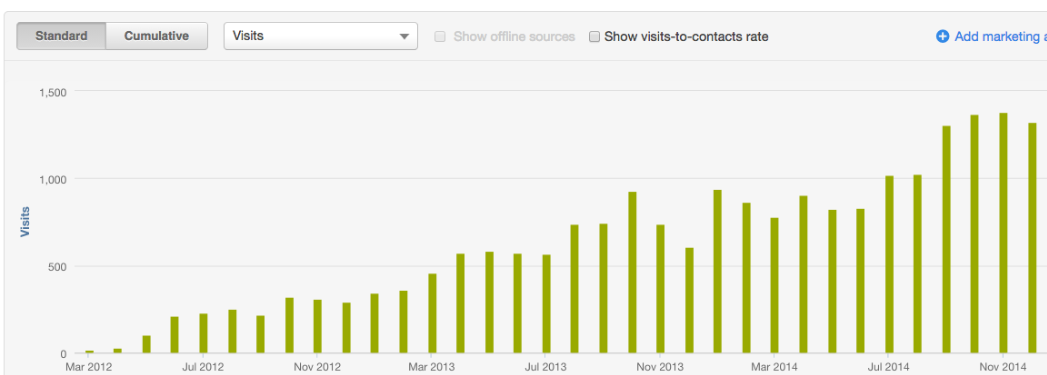The new business buying process is one of the best things to ever happen to the management consulting industry. The Corporate Executive Board found that the average buyer completes 57% of their sales process before ever contacting a salesperson. They conduct pre-purchase research with search engine queries and talk to trusted colleagues to learn how they've solved similar problems. The old lead generation techniques of telemarketing and spam email approaches are just as likely to annoy a prospect as to create interest in your solutions - if they even answer the phone or read the email. That's why it's so important for management consultants to to use content marketing to generate leads and position yourself as a trusted advisor within your industry.
Content marketing is the practice of creating educational material in the forms of blogs, videos, webinars, eBooks and whitepapers to draw qualified prospects into your sales funnel and help them as they move to a purchase decision. Remember, buyers are doing most of their research before they ever engage with a salesperson. If they don't find you when they're doing research, you'll never have a chance to get their business. So with that in mind, here are 7 tips to help optimize your management consulting content marketing.
1. Use your website as the hub for your content marketing program and optimize for customers
An interactive, easy-to-navigate website is a necessity for a successful content marketing program. Google's latest algorithm update, Hummingbird, continues Google's efforts to reward websites that optimize for customers, not search engines.
So what does this mean for you? It's simple - you should manage your website for your ideal customers, not for your company. People don't read websites like newspapers - they skim headlines and copy, looking for the information that will help them solve problems or educate themselves. In most cases, you should have less than 200 words of copy on your high-impact webpages. Each page should be optimized for 1 (no more than 2) keyword phrases and have 1 or 2 goals. For example, your homepage may have the goals of:
-
communicating your value proposition
-
guiding a vistor to a lead-generation landing page for a top-of-the funnel content offer
If you try to do more than that, you're likely to give your visitor too many choices, which will result in them bouncing off your site. It's truly a case of KISS (keep it simple, stupid!) So make it easy for your visitors to find helpful information.
2. Blog regularly
Blogging is the most effective way to generate organic search traffic to your website. Here's a graphical representation of how your management consulting firm can generate organic search traffic to your website by a regular blogging regimen:

It's important to view your blog as if you were a publisher. Keep a regular publishing schedule and stick to it. In order to get results, I highly recommend that you blog weekly, if not more frequently. So what should you write about? Here are some ideas:
-
What are the top 10 questions you hear from your customers? Those can be your first 10 blog posts.
-
Give your take on industry events - don't afraid to be controversial! Your unique take on things gives you a chance to show your personality and drive traffice.
-
Write how-to articles - don't be afraid to give free samples of your consulting expertise. Just because you tell someone how to do something doesn't mean that your prospect will have the talent or resources to do it.
Keep in mind that blog articles are evergreen marketing assets. The web page that produces the most traffic for me every day was written 9 months ago.
3. Make sure to include lead conversion offers in your blog articles.
If someone likes your blog article and wants to learn more, give them an opportunity to become a sales lead by downloading a deeper dive piece of content like an eBook in exchange for contact information. Use calls-to-action to drive interested buyers to landing pages to access the content.
Many management consultants put in the effort to blog without including lead generation offers in their content. Don't make this mistake. I've included a call-to-action for our The Complete Professional Services Content Marketing Guide directly below this sentence. I encourage you to click throught to see the landing page for lead conversion (and the eBook, if you'd like to access it.)
4. Use different media in your content marketing efforts
Written content like blogs and eBooks are the foundation of your content marketing efforts. But don't be afraid to mix it up - use videos, Slideshare presentations, webinars, seminars and infographics to educate your target audience. Visual media is very effective to separate your content from all the noise that's out there.
You don't have to Stanley Kubrick to do video marketing - use your smartphone to create videos to help educate your audience. You can also use affordable animated video production software like PowToon and GoAnimate to create videos. Wistia offers some great resources for DIY video marketing and production.
5. Use social media to promote your content
When you start creating content, it will take some time for Google to index your site and for you to establish domain authority. Don't let this slow you down! Keep publishing good content, Google will catch up with you.
You should also use your social media channels to promote your blog content. Don't be overtly salesy - you're creating helpful content and you want your social media posts to be helpful as well. Mix in helpful content from others with yours in your social media posts.
Reach out to friends, vendors, customers and others to help share your content on their social media profiles. This should be a two-way street - make sure to return the favor.
6. Feature your customers in your content
Case studies and stories of how you and your customers jointly solved problems and generated positive outcomes are good ways to educate your audience and provide social proof of your expertise. Make sure to ask your customers if you can use their names and talk about how you jointly solved problems. Most people will be happy to be portrayed in a favorable light in your marketing content. Customer interviews are an excellent way to do this.
7. Use inbound marketing software for a lean process to optimize your content marketing results.
Inbound marketing software like HubSpot or InfusionSoft allows you to measure what's working and what isn't in your content marketing. You can measure everything from the sources of your website traffic to how well your landing pages are performing. Use lean experiments to find the tactics and techniques that create the best business results for you.
Content marketing can supplement referrals from satsified customers as a predictable, scalable source of sales leads for your management consulting business. Use these 7 best practices to manage a high-performing content marketing effort that generates business leads and positions you as a trusted advisor within your industry specialty.








